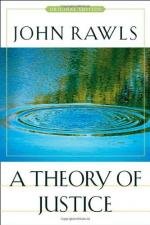|
This section contains 825 words (approx. 3 pages at 400 words per page) |

|
Individual Liberties
In formulating his theory of justice as fairness, Rawls makes clear that the guaranteed freedom of each and every individual is essential to the establishment of a just society. He thus determines that liberty is the first priority in a hierarchy of principles defining justice; he places limitations on individual liberty only insofar as it impinges on the liberty of others. The first principle is stated as: "each person is to have an equal right to the most extensive scheme of equal basic liberties compatible with a similar scheme of liberties for others." In defining what he means by liberty, Rawls points out that there are different types of liberty and that some are more crucial to a just society than others. The most important liberties he describes as first, "freedom of thought and liberty of conscience," and second, "freedom of person and the civil liberties." Rawls...
|
This section contains 825 words (approx. 3 pages at 400 words per page) |

|




